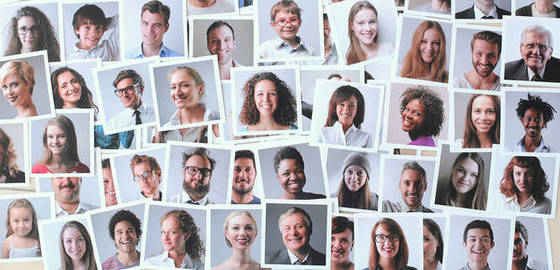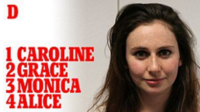Do you look like your name? A recent HEC Paris research shows that your name might shape your face
If your name is Fred, do you look like a Fred? You might – and others might think so, too. This is the results of the highly original study by researchers including HEC Paris Professor Anne-Laure Sellier. They have found that cultural stereotypes around names can lead to real changes in facial appearance. The research conducted by academics from the Hebrew University of Jerusalem, HEC Paris and Columbia University, published their conclusions last week in the Journal of Personality and Social Psychology

These reveal that people are consistently able to correctly match a person’s face with their name, despite the fact they have never seen that person before. The study also shows that computers can also be programmed to accurately recognize the exact name of a face. These groundbreaking findings have already been featured by several international media outlets including The Times, New York Magazine, Wall Street Journal, Huffington Post…
The researchers conducted a series of experiments involving hundreds of participants in Israel and France. In each experiment, participants were shown a photograph and asked to select the given name that corresponded to the face from a list of four or five names. In every experiment, the participants were significantly better (25 to 40 percent accurate) at matching the name to the face than random chance (20 or 25 percent accurate depending on the experiment) even when ethnicity, age and other socioeconomic variables were controlled for.
 The researchers theorize the effect may be due to cultural stereotypes associated with names as they found the effect to be culture-specific. In one experiment conducted with students in both France and Israel, participants were given a mix of French and Israeli faces and names. The French students were better than random chance at matching French names, but not Israeli faces; and conversely, Israeli students were accurately matched Israeli faces to their names above chance level, but not French faces. This suggest that a given society shares a culture-specific stereotype of a face for a given name.
The researchers theorize the effect may be due to cultural stereotypes associated with names as they found the effect to be culture-specific. In one experiment conducted with students in both France and Israel, participants were given a mix of French and Israeli faces and names. The French students were better than random chance at matching French names, but not Israeli faces; and conversely, Israeli students were accurately matched Israeli faces to their names above chance level, but not French faces. This suggest that a given society shares a culture-specific stereotype of a face for a given name.
Algorithms confirm the outcome
In another experiment, the researchers trained a computer, using machine learning, to match names to faces. In this experiment, which included over 94,000 facial images, the computer was also significantly more likely (54 to 64 percent accuracy) to be successful than random chance (50 percent accuracy).This manifestation of the name in a face might be due to people subconsciously altering their appearance to conform to cultural norms and cues associated with their names, according to Yonat Zwebner, Wharton Post-Doc and lead author of the paper. “We are familiar with such a process from other stereotypes, like ethnicity and gender where sometimes the stereotypical expectations of others affect who we become,” said Zwebner. “Prior research has shown there are cultural stereotypes attached to names, including how someone should look. For instance, people are more likely to imagine a person named Bob to have a rounder face than a person named Tim. We believe these stereotypes can, over time, affect people’s facial appearance.”
This was supported by findings in one experiment showing that areas of the face that can be controlled by the individual, such as hairstyle, were sufficient to produce the effect.
“Together, these findings suggest that facial appearance represents social expectations of how a person with a particular name should look. In this way, a social tag may influence one’s facial appearance,” said co-author Ruth Mayo, PhD, also from The Hebrew University of Jerusalem. “We are subject to social structuring from the minute we are born, not only by gender, ethnicity and socioeconomic status, but by the simple choice others make in giving us our name.”
Impact and Next steps…
Finally, the use of these findings might have some impact for business. “I have already received supportive comments from high-tech entrepreneurs, who see opportunities for online segmentation” says Anne-Laure Sellier, HEC Paris Professor of Marketing. “Also, the mechanism we identify does not only stop at first names but may include anything that we use to signal that we belong to a specific group. This is speculative for now, but we may well similarly recognize a loyal Apple user, or people who have been wearing a specific perfume for a long time. In sum, the face-name effect that we identified is a celebration of the extent we are intensely social beings, who crave to live up to their society’s expectations. Whatever those expectations are, even if it just means looking like a Sophie. If we live up to our names, we might well live up to other cues that make it easy for us to simply belong. “
Journal of Personality and Social Psychology
We Look Like Our Names: The Manifestation of Name Stereotypes in Facial Appearance - Online First Publication, February 27, 2017
Collaborators in this research, partly funded by the HEC Foundation in Paris, included Anne-Laure Sellier from HEC Paris; Nir Rosenfeld of the Hebrew University of Jerusalem; and Jacob Goldenberg from the Interdisciplinary Center (IDC) Herzliya and Columbia University in New York.